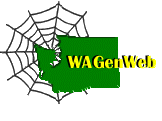Pioneer life in the Benton Co. WA area
Local Politics Were Different in The Early Days
By BURTON 0. LUM
Tri-City Pioneer
Tri-City Herald, Sunday, October 16, 1960, page 24
Political meetings in the Tri-City region were few. The transportation facilities were poor. The population was scattered. Methods of communication were slow and inadequate, there being no rural or star mail routes and no telephones.
In Kennewick, the telegrapher, who was also the postmaster, would notify the inhabitants when the Presidential train would make a longer stop at the west portal of the Kennewick Bridge in order to meet the people. The families would scramble up the steep railroad fill at the west portal of the bridge and shake hands with the presidential nominee as he stood on the rear platform of the train.
I shook hands with President Harrison and marveled at his long beard. When President McKinley stopped I shook his hand and saw his wife sitting in her wheel chair.
President Grover Cleveland did not hold a reception at the bridge.
The population of Kennewick was quite equally divided between the Democratic Party and the Republican Party. Those from the South were preponderantly Democratic and those from the New England states were mostly Republicans.
At the Kennewick School, the pupils followed the political faith of their fathers, as the mothers were not allowed to vote in these early days. When recess and noon arrived the pupils would chant and sing the different campaign slogans and songs of each party. Campaign buttons first appeared in Kennewick during the McKinley-Bryan campaign.
Charley Harris from Pasco, running for the State Legislature, (if my memory serves me right) gave me a political rally in the old Kennewick School House. Charley was a “humdinger” in those days, which would rate him at least a “wheel” or a “brain” today.
His mother, Mrs. Watters and half-brother, Jim Watters, ran a business in Pasco. Charley passed the state bar examination and was one of Pasco’s leading lawyers. He also published Pasco’s only newspaper, “The Pasco Headlight”. His political opponents, the Republicans, called it “The Pasco Headache”.
Charley was a great showman. At his rally in the Kennewick School House, he demonstrated “The greatest invention of the century”, a small phonograph which squeeked out on a scratchy record, “Down on the Brandywine”.
He also showed a small metal bottle to which was attached a cord and leather strap to buckle around ones ankle. This contraption he called an “Oxydonner”. To quote from the conclusion of his speech, “Just take your hammock to the bank of the crystal blue Columbia, strap the osydonner to your ankle, cast its metal bottle on Columbia’s bosom. Turn on the phonograph. Take the Pasco Headlight in your hands. Lie back on your pillow and pleasantly proceed to peruse its pithy pages”. Ah! Me! Charley you were a “Humdinger”.
An interesting episode occurred after McKinley’s defeat of William Jennings Bryan in November 1896. The women folks were not allowed to vote at this time so consequently they were not as interested in political affairs as the men. We lived at this time in our home called the “White Front” situated on the crest of a hill in Delhaven Addition, an addition father had platted after we had been washed out on the flat during the highwater flood in 1894.
Mother and a few of her chums arranged a surprise for the men of the community. They stealthily brought a feast into our house and when they had everything prepared in the evening, they placed lighted tallow candles in all windows facing town. Everyone thought the “White Front” was on fire and came running to help put it out.
They were all dumbfounded when they were invited in to the feast. The candles were all snuffed out. The house lamps were lit. The food was placed on the many tables that had been prepared.Everyone found their seats at the tables. Grace was returned. Everyone ate his fill.
The violin and accordion played. All sang old songs. The tables were pushed back. A caller called a quadrille. The dance was on. The musicians varied their music, waltzes, schottisches, reels, polkas, and quadrilles. Dawn broke. The musicians played a Home Sweet Home waltz and Auld Lnag Syne which everyone sang. Three cheers were given for the ladies who made the party possible. All left for their various homes.
Return to Index of Burton Lum Articles
